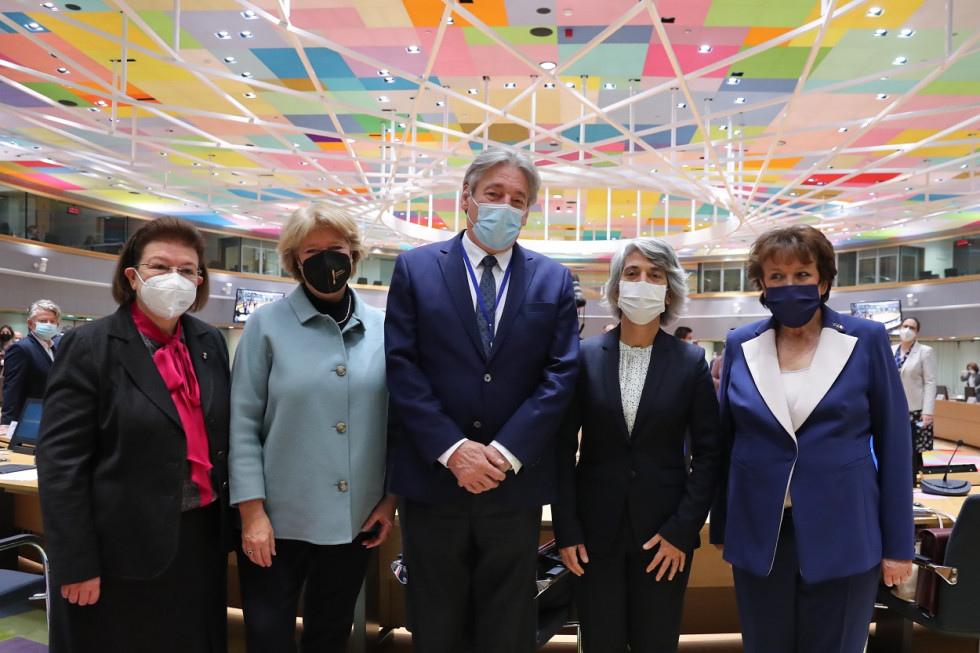Culture for a better tomorrow

Vasko Simoniti, Minister of Culture of the Republic of Slovenia, at a meeting of ministers of culture, audiovisual affairs and the media in Brussels on 30 November | Author European Union
The morning session of the Education, Youth, Culture and Sport Council, which was devoted to discussions on culture, began with the approval of conclusions on high-quality architecture and the New European Bauhaus initiative. The conclusions are the result of a recognition that innovation and technological advances should always be harmonised with the human need for a quality living environment, where architectural solutions combine tradition with the modern technology.
The European Commission designed the New European Bauhaus initiative to pursue the goals of the European Green Deal through culture, cultural heritage, creativity, research and technical innovations. The President of the European Commission, Ursula von der Leyen, said that the New European Bauhaus "is the soul of the European Green Deal" in her State of the Union address in September. Recommendations and incentives from the approved conclusions should encourage member states to implement the proposed qualitative criteria into spatial planning, to follow the principles of circular economy and to improve access to information and financial instruments, supporting future projects connected to the living environment. The minister emphasised that the goal was to make culture, high-quality architecture and built environment, which are key elements of the New European Bauhaus, the basis of all interministerial policies in the field of living environment.
Approving the conclusions on European audiovisual and media content, the minister expressed his concern as the European audiovisual and media sector is still suffering the consequences of the COVID-19 pandemic. He explained that significantly lower revenues in cinemas have led to reduced funding for original European productions. This, he said, "has brought about competition between providers for a dominant position in the on-demand audiovisual services market, with significant differences between providers".
The aim of the approved conclusions is to encourage the member states and the European Commission to adopt measures in their jurisdiction to provide the audiovisual and media sector with a competitive advantage on the European and international market and enable sustainable development. The proposed measures emphasise solutions, which would increase the visibility and availability of the European audiovisual and media content on the digital market, while innovation, creativity, and cultural and linguistic diversity are the key to improving European audiovisual and media content's competitiveness and also its main strength.
The ministers also held a policy debate, with Mr Simoniti chairing an exchange of views on the strategic importance of heritage rights for the future of Europe and global sustainable development. At the invitation of Minister Simoniti, the Secretary-General of Europa Nostra Sneška Quaedvlieg-Mihailović also participated in the debate. During the discussion, the participants also expressed their concern over the situation of culture heritage and artists, especially female artists, in Afghanistan. To conclude, Mr Simoniti emphasised that asylum and migration policies do not fall within the jurisdiction of the European Union nor within that of culture ministers, but "as culture ministers we have the moral right to call for reflection on how we can contribute to the humane treatment of the most at-risk groups of artists from this country. The least we can do is make sure that the voices of these artists are heard."
At the end of the session, ministers took note of the initiatives for the recovery of the cultural sector following the COVID-19 pandemic and listened to presentation of priorities of the upcoming French presidency of the Council of the EU. The European Commission held a presentation on establishment of a single point for financing cultural sectors in the 2021–2027 period.
Minister Simoniti thanked his colleagues for the constructive debate and their cooperation in drawing up the final draft conclusions, and stressed that the approved conclusions were an important achievement of the Slovenian Presidency of the Council of the European Union. In this regard, he thanked the representatives of the Trio Presidency: "Today's council meeting concludes a period of prolific and important work done by the Trio Presidency. Therefore, I want to thank my German and Portuguese colleagues for the cooperation." He also expressed his well wishes to the French delegation that will take the helm of the Council of the European Union on 1 January 2022.
Education, Youth, Culture and Sport Council, 29-30 November 2021

